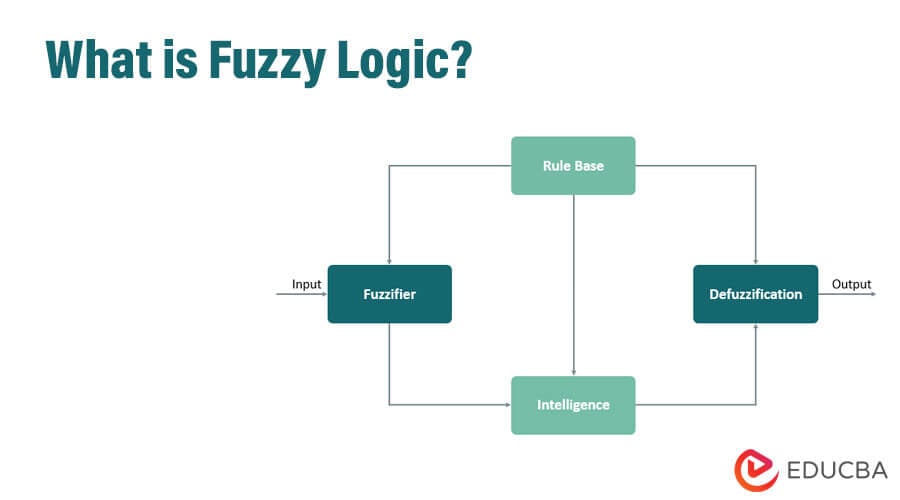Updated June 30, 2023
Introduction to Fuzzy Logic
Fuzzy logic is an approach to decision-making that involves more than just simple yes or no values. Instead, it utilizes a fuzzy set and a computer process that can understand natural language. The system operates on the principle of assigning individual output based on the probability of an input state.
Understanding the Basics
The word ‘fuzzy’ signifies that there may be some imprecision involved in the decision-making process. It comprises four components: a fuzzifier, rules, an inference engine, and a defuzzifier. In fuzzy logic, true statements become a matter of degree. Fuzzy logic is a control logic that uses degrees of input and output to simulate human reasoning by integrating rule-based implementation. This technique manipulates and manages uncertain or imprecise information or facts.
Linguistic variables are input or output variables that have values expressed in words, rather than numbers. For example, “temperature” (T) can be a linguistic variable.
Membership functions are context-dependent mappings to transform non-fuzzy values into fuzzy values. As an example, for the temperature variable, membership functions might include:
T (temperature) = {cold, hot, warm}
Fuzzy logic includes connectives like conjunctions and disjunctions to handle degrees of uncertainty. Additionally, there is a set of inference rules for making decision statements. These rules help to represent a type of human expertise.
How does Fuzzy Logic make work easier?
In certain scenarios, mathematical models are used to process non-linear systems. However, in recent times, the focus has been on achieving this at lower costs, leading to a renewed interest in fuzzy logic. With fuzzy logic, even complicated systems have an efficient processing system, as it helps to simplify the problem-solving process. The concept of fuzzy logic is based on human reasoning, which is why it can make jobs easier for human operators.
What is the use of Fuzzy Logic?
Fuzzy logic is a rule-based phenomenon that relies on artificial intelligence software and is a subset of AI. It has application in various fields, including engineering applications and non-engineering applications, such as medical diagnosis and stock analysis. In general, fuzzy logic is applicable to any system with input and output logic.
Working
Fuzzy logic works on the concept of sets, and the output decisions are based on assumptions. A fuzzy set can have a range of values between 0 and 1. Fuzzy logic uses if-then rules for reasoning, where a true value gets a degree of 1 and a false value gets a degree of 0, with partial values for imprecision. The system output forms by grouping these fuzzy actions together.
For example, consider the following:
- Is Saturday a weekend day? the fuzzy answer is 1, meaning true.
- Is Sunday a weekday? the fuzzy answer is 0.9.
The input data is first grouped and transformed into a fuzzy set using membership functions and linguistic terms. This process is fuzzification. Based on the set of rules, an inference is made. Finally, during the defuzzification step, the yielded fuzzy output is mapped to a crisp output with the help of membership functions.
For instance, in an air conditioning system, the fuzzy logic system plays a role in declaring linguistic variables for temperature, defining membership sets (0,1), and establishing a set of rules. Through the process of fuzzification, the fuzzy set is crisped, and operations like AND and OR are performed by the inference engine on the rules. Finally, defuzzification helps convert the desired output into non-fuzzy numbers.
Advantages
- Fuzzy logic has commercial and practical applications.
- Fuzzy logic has simplicity and flexibility and is applicable to various engineering products, such as constructing non-linear functions.
- Algorithms and mathematical concepts behind the fuzzy system are easy and natural.
- Fuzzy logic simplifies the implementation of conventional systems, and their work is easy to understand.
Why Use Fuzzy Logic?
Fuzzy logic is a useful tool in many industries due to its simplicity and flexibility. It provides a degree of possibility, which is more easily understood than a binary distribution. Academics and industry professionals are exploring fuzzy logic to solve problems related to uncertain information. Recent research has shown that fuzzy logic is suitable for control system applications, including weather and earthquake forecasting in China.
1. Scope
Fuzzy logic systems has uses in a wide range of applications, such as videography, telecommunications, washing machines, cars, and air conditioning. They function in channels equalization, signal detection, and signal processing, as well as in automotive systems, televisions, hi-fi, and microwave ovens. In aerospace, fuzzy logic plays a vital role in satellite control and altitude decisions in spacecraft.
2. Why do we need it?
Fuzzy logic is helpful in implementing artificial intelligence and serves as a decision-support tool for managers in the business sector. It also helps in computing natural language with imprecise probabilities. Fuzzy logic real-world applications involve linguistic variables, which is the concept of precision. Fuzzy logic has a high impact on fields such as medicine and conflict resolution.
3. How will this tool help in career growth?
Fuzzy logic is a growing field, and there is an increasing demand for professionals who understand its concepts. Learning fuzzy logic can lead to a career in the specialization fields of machine learning, artificial intelligence, and mathematics. These professionals find employment in manufacturing, machines, finance, and accounting.
Conclusion
Here are the basics of fuzzy logic and its workings. In the coming years, fuzzy logic is expected to play an important role in the development of real-life applications. In addition to that, there are numerous other areas where it is still in development.
Recommended Articles
Here are some further articles to increase understanding:





